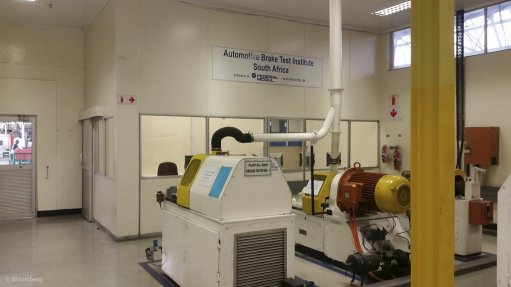
SANAS ACCREDITED Being SANAS registered ensures credibility as well as legitimate compliance reports
Powertrain components and vehicle-safety products developer, manufacturer and supplier Federal-Mogul launched its new brake test centre, which received ISO/IEC 17025 accreditation from the South African National Accreditation System (SANAS) last month.
Federal-Mogul operations manager Reegan Govender tells Engineering News that the company has also been SANS 20090 accredited for the new brake test centre and that the launch was held for key customers and the media to showcase its latest accreditation in terms of ISO/IEC 17025 by SANAS.
This means that the test centre is officially approved for testing and issuing compliance reports for replacement brake pads and commercial vehicle linings to the South African compulsory specification VC8053. This ISO 17025 laboratory specification is aimed at the development of a quality management system that provides for continual improvement, emphasising the accuracy and reproducibility of testing results.
Federal-Mogul has pursued the accreditation in the interests of safety in the South African automotive components sector, as all friction materials for sale in the local market have to comply with the compulsory specification. A significant proportion of replacement brake pads, however, are imported, meaning the compliance and competence for use in South Africa of such products has not been effectively evaluated. These safety specifications are regulated by the National Regulator for Compulsory Specification (NRCS), which is affiliated with the Department of Trade and Industry.
“The new testing centre has taken about three years to complete and has the full support of Federal-Mogul’s global teams, including financial, supply chain and technical expertise,” Govender says.
This has not only created more jobs, but also uplifted and reskilled specifically the company’s mechanical engineering graduates, who spent six weeks in the company’s research and development centres in Germany and the UK, where they acquired technical competency training in various aspects of braking technology and testing.
Govender points out that Federal-Mogul has operations on almost every continent, including technical test centres. However, the new South African test centre has been established to specifically service the needs of the local market, based on the specific regulatory requirements of our country.
He explains that the type of testing required in South Africa is much harsher than that required in other countries, owing to the climate and local driving behaviour. Testing is based on the SANS 20090 technical requirements, which define the criteria for compliance of the replacement brake pads. The evaluation criteria include the three aspects of cold performance pressure sensitivity, speed sensitivity and the high temperature stability characteristics of the brake pad.
The company cites that the test centre incorporates more modern technology, such as an inertia simulation dynamometer, which allows for the accurate testing of various gross vehicle mass and inertia applications, than competitors.
Additionally, Federal-Mogul is a global brand which allows for the technology and skills it employs to be constituted from a global perspective. Therefore, going forward, this expertise can be used to test various brake pads to ensure compliance with local standards and that the market receives service levels associated with a global automotive manufacturer and supplier.
Further, Govender notes that the new test centre also aims to raise awareness among original-equipment manufacturers and the market in general of the company’s testing capabilities.
The company is specifically targeting the light- and commercial-vehicle markets from a safety perspective, as these markets are the most intensive road users.
“We feel that we have the capability to service the specific needs of these markets and use our capabilities to provide an efficient turnaround time and accurate test results to our customers,” concludes Govender.